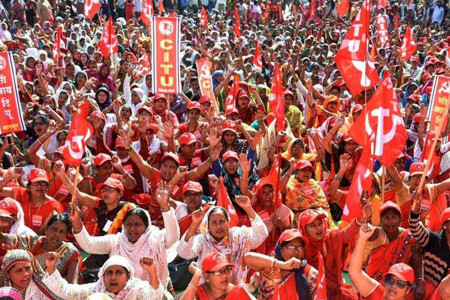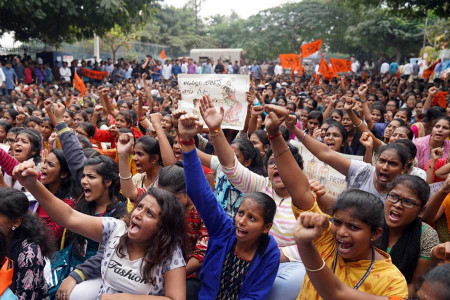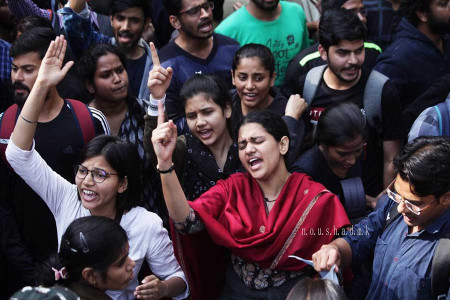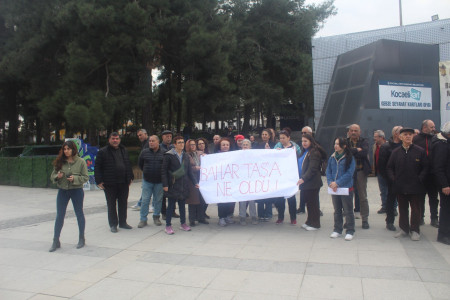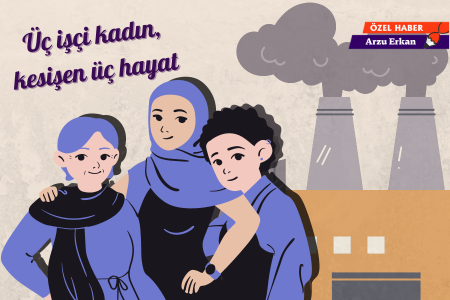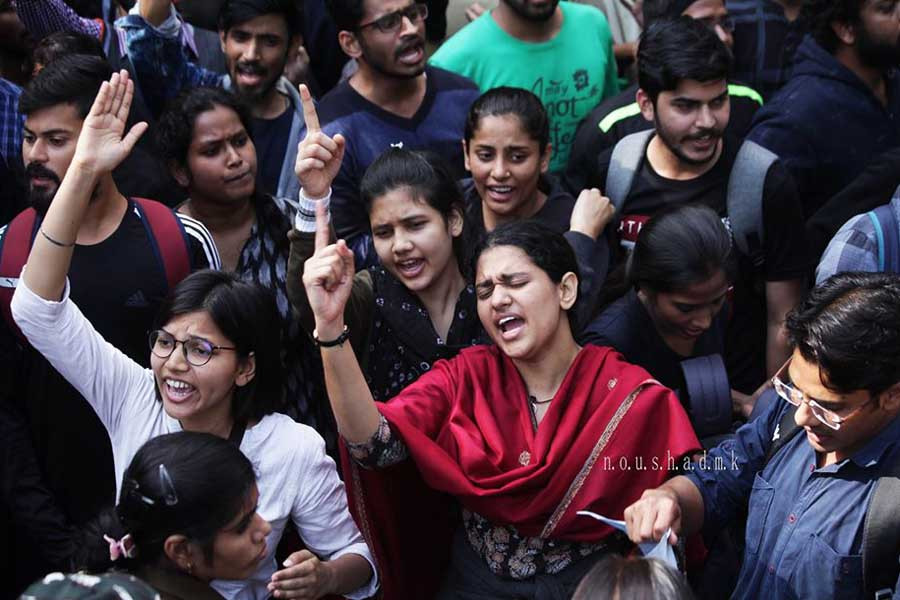
Higher education in India is under attack from neoliberal fascistic forces. Ever since the elections of 2014 in which the Bharatiya Janata Party (BJP) came to power with a large majority, the Narendra Modi government has enabled the rise of Hindutva fascism. Hindutva is a socio-political ideology which treats India to be the homeland primarily of Hindus, with people of other faiths such as Muslims and Christians to be foreign ‘intruders’ who need to assimilate into Hinduism or need to be expelled from the country.
Support for the government and its ideology has become conflated with support for the Indian nation as a whole, with any critical voices being branded ‘anti-nationals’, ‘terrorists’ and ‘Naxals ’.(1) This near consensus of public opinion has provided the Modi government the support needed to pursue aggressively neoliberal economic policies, to keep its promise of turning India into a ‘global superpower’.
The BJP government’s economic policies are aimed at attracting maximum foreign capital and for encouraging domestic capital through various initiatives such as Start Up India, Make in India etc. The basis of its economic policy is to provide tax subsidies, ensure labour market ‘flexibility’ i.e. easy hiring and firing of workers, and to ensure easy credit to businesses through public sector banks. The government is also eliminating the last vestiges of the welfare state in India, especially in education, health, affirmative action and employment guarantees. This is done both by decreasing financial support for the public sector and by actively encouraging the private sector to fill the gap.
The case of Jawaharlal Nehru University (JNU) shows the absolute erosion of any move towards social and economic justice made in post colonial India. JNU was established in New Delhi in 1969 and has consistently been among the best universities in the country. Being a Central University, JNU was funded primarily the Central government, which allowed the fees to be kept low. Along with low fees and a residential campus which subsidized cost of living, JNU also had affirmative action policies which enabled the admission of students from disadvantaged sections of the society. As a result, JNU would attract students from all parts of the country, from rural and urban areas, students who could or could not speak English, students with physical disabilities, students with no financial means, and it also attracted a large number of female students.
Along with its truly representative student composition, JNU has also been the bastion of leftist politics and academics in the country. JNU students have been politically active on most national and international issues. JNU also has a strong tradition of debate and dissent, and the campus has a robust politics with the Students Union and the Teachers Association playing a key role in the university’s day to day functioning and overall direction.
JNU played a critical role — it provided quality education at a very subsidized cost to the very people who needed it most — the historically disadvantaged sections of Indian society. In doing so, it also exposed these students to a radical campus environment which fostered debate, critical thought and the aspiration for a better, more equal and more just world. It is no surprise that JNU became among the first targets of the Modi led government.
Higher education in India is under attack from neoliberal fascistic forces. Ever since the elections of 2014 in which the Bharatiya Janata Party (BJP) came to power with a large majority, the Narendra Modi government has enabled the rise of Hindutva fascism. Hindutva is a socio-political ideology which treats India to be the homeland primarily of Hindus, with people of other faiths such as Muslims and Christians to be foreign ‘intruders’ who need to assimilate into Hinduism or need to be expelled from the country.
Support for the government and its ideology has become conflated with support for the Indian nation as a whole, with any critical voices being branded ‘anti-nationals’, ‘terrorists’ and ‘Naxals ’.(1) This near consensus of public opinion has provided the Modi government the support needed to pursue aggressively neoliberal economic policies, to keep its promise of turning India into a ‘global superpower’.
The BJP government’s economic policies are aimed at attracting maximum foreign capital and for encouraging domestic capital through various initiatives such as Start Up India, Make in India etc. The basis of its economic policy is to provide tax subsidies, ensure labour market ‘flexibility’ i.e. easy hiring and firing of workers, and to ensure easy credit to businesses through public sector banks. The government is also eliminating the last vestiges of the welfare state in India, especially in education, health, affirmative action and employment guarantees. This is done both by decreasing financial support for the public sector and by actively encouraging the private sector to fill the gap.
The case of Jawaharlal Nehru University (JNU) shows the absolute erosion of any move towards social and economic justice made in post colonial India. JNU was established in New Delhi in 1969 and has consistently been among the best universities in the country. Being a Central University, JNU was funded primarily the Central government, which allowed the fees to be kept low. Along with low fees and a residential campus which subsidized cost of living, JNU also had affirmative action policies which enabled the admission of students from disadvantaged sections of the society. As a result, JNU would attract students from all parts of the country, from rural and urban areas, students who could or could not speak English, students with physical disabilities, students with no financial means, and it also attracted a large number of female students.
Along with its truly representative student composition, JNU has also been the bastion of leftist politics and academics in the country. JNU students have been politically active on most national and international issues. JNU also has a strong tradition of debate and dissent, and the campus has a robust politics with the Students Union and the Teachers Association playing a key role in the university’s day to day functioning and overall direction.
JNU played a critical role — it provided quality education at a very subsidized cost to the very people who needed it most — the historically disadvantaged sections of Indian society. In doing so, it also exposed these students to a radical campus environment which fostered debate, critical thought and the aspiration for a better, more equal and more just world. It is no surprise that JNU became among the first targets of the Modi led government.

Higher education in India is under attack from neoliberal fascistic forces. Ever since the elections of 2014 in which the Bharatiya Janata Party (BJP) came to power with a large majority, the Narendra Modi government has enabled the rise of Hindutva fascism. Hindutva is a socio-political ideology which treats India to be the homeland primarily of Hindus, with people of other faiths such as Muslims and Christians to be foreign ‘intruders’ who need to assimilate into Hinduism or need to be expelled from the country.
Support for the government and its ideology has become conflated with support for the Indian nation as a whole, with any critical voices being branded ‘anti-nationals’, ‘terrorists’ and ‘Naxals ’.(1) This near consensus of public opinion has provided the Modi government the support needed to pursue aggressively neoliberal economic policies, to keep its promise of turning India into a ‘global superpower’.
The BJP government’s economic policies are aimed at attracting maximum foreign capital and for encouraging domestic capital through various initiatives such as Start Up India, Make in India etc. The basis of its economic policy is to provide tax subsidies, ensure labour market ‘flexibility’ i.e. easy hiring and firing of workers, and to ensure easy credit to businesses through public sector banks. The government is also eliminating the last vestiges of the welfare state in India, especially in education, health, affirmative action and employment guarantees. This is done both by decreasing financial support for the public sector and by actively encouraging the private sector to fill the gap.
The case of Jawaharlal Nehru University (JNU) shows the absolute erosion of any move towards social and economic justice made in post colonial India. JNU was established in New Delhi in 1969 and has consistently been among the best universities in the country. Being a Central University, JNU was funded primarily the Central government, which allowed the fees to be kept low. Along with low fees and a residential campus which subsidized cost of living, JNU also had affirmative action policies which enabled the admission of students from disadvantaged sections of the society. As a result, JNU would attract students from all parts of the country, from rural and urban areas, students who could or could not speak English, students with physical disabilities, students with no financial means, and it also attracted a large number of female students.
Along with its truly representative student composition, JNU has also been the bastion of leftist politics and academics in the country. JNU students have been politically active on most national and international issues. JNU also has a strong tradition of debate and dissent, and the campus has a robust politics with the Students Union and the Teachers Association playing a key role in the university’s day to day functioning and overall direction.
JNU played a critical role — it provided quality education at a very subsidized cost to the very people who needed it most — the historically disadvantaged sections of Indian society. In doing so, it also exposed these students to a radical campus environment which fostered debate, critical thought and the aspiration for a better, more equal and more just world. It is no surprise that JNU became among the first targets of the Modi led government.
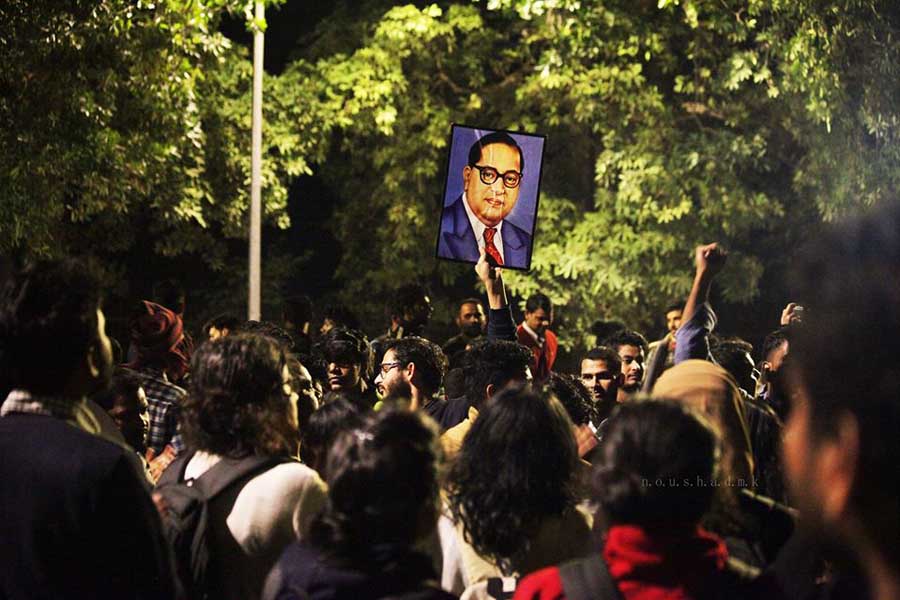
Higher education in India is under attack from neoliberal fascistic forces. Ever since the elections of 2014 in which the Bharatiya Janata Party (BJP) came to power with a large majority, the Narendra Modi government has enabled the rise of Hindutva fascism. Hindutva is a socio-political ideology which treats India to be the homeland primarily of Hindus, with people of other faiths such as Muslims and Christians to be foreign ‘intruders’ who need to assimilate into Hinduism or need to be expelled from the country.
Support for the government and its ideology has become conflated with support for the Indian nation as a whole, with any critical voices being branded ‘anti-nationals’, ‘terrorists’ and ‘Naxals ’.(1) This near consensus of public opinion has provided the Modi government the support needed to pursue aggressively neoliberal economic policies, to keep its promise of turning India into a ‘global superpower’.
The BJP government’s economic policies are aimed at attracting maximum foreign capital and for encouraging domestic capital through various initiatives such as Start Up India, Make in India etc. The basis of its economic policy is to provide tax subsidies, ensure labour market ‘flexibility’ i.e. easy hiring and firing of workers, and to ensure easy credit to businesses through public sector banks. The government is also eliminating the last vestiges of the welfare state in India, especially in education, health, affirmative action and employment guarantees. This is done both by decreasing financial support for the public sector and by actively encouraging the private sector to fill the gap.
The case of Jawaharlal Nehru University (JNU) shows the absolute erosion of any move towards social and economic justice made in post colonial India. JNU was established in New Delhi in 1969 and has consistently been among the best universities in the country. Being a Central University, JNU was funded primarily the Central government, which allowed the fees to be kept low. Along with low fees and a residential campus which subsidized cost of living, JNU also had affirmative action policies which enabled the admission of students from disadvantaged sections of the society. As a result, JNU would attract students from all parts of the country, from rural and urban areas, students who could or could not speak English, students with physical disabilities, students with no financial means, and it also attracted a large number of female students.
Along with its truly representative student composition, JNU has also been the bastion of leftist politics and academics in the country. JNU students have been politically active on most national and international issues. JNU also has a strong tradition of debate and dissent, and the campus has a robust politics with the Students Union and the Teachers Association playing a key role in the university’s day to day functioning and overall direction.
JNU played a critical role — it provided quality education at a very subsidized cost to the very people who needed it most — the historically disadvantaged sections of Indian society. In doing so, it also exposed these students to a radical campus environment which fostered debate, critical thought and the aspiration for a better, more equal and more just world. It is no surprise that JNU became among the first targets of the Modi led government.
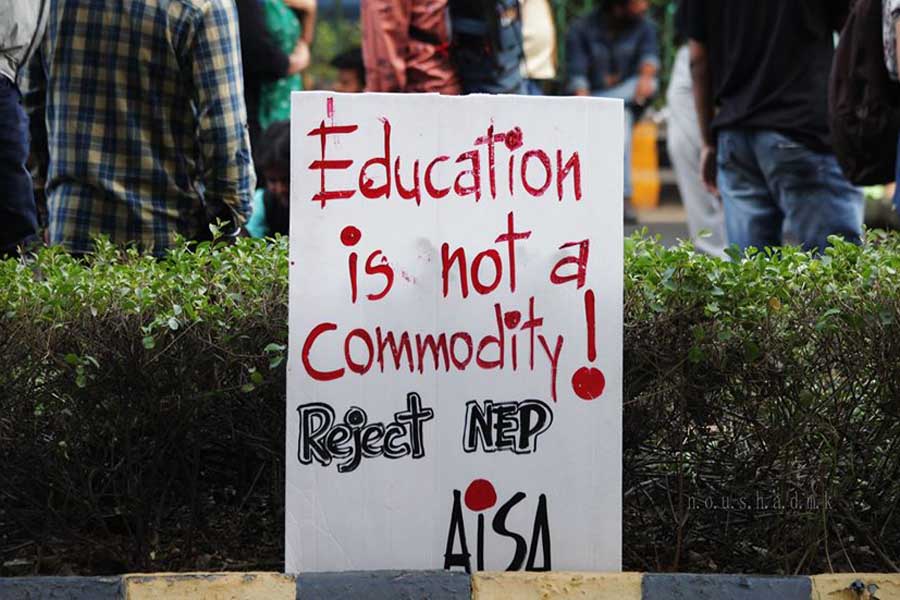
Higher education in India is under attack from neoliberal fascistic forces. Ever since the elections of 2014 in which the Bharatiya Janata Party (BJP) came to power with a large majority, the Narendra Modi government has enabled the rise of Hindutva fascism. Hindutva is a socio-political ideology which treats India to be the homeland primarily of Hindus, with people of other faiths such as Muslims and Christians to be foreign ‘intruders’ who need to assimilate into Hinduism or need to be expelled from the country.
Support for the government and its ideology has become conflated with support for the Indian nation as a whole, with any critical voices being branded ‘anti-nationals’, ‘terrorists’ and ‘Naxals ’.(1) This near consensus of public opinion has provided the Modi government the support needed to pursue aggressively neoliberal economic policies, to keep its promise of turning India into a ‘global superpower’.
The BJP government’s economic policies are aimed at attracting maximum foreign capital and for encouraging domestic capital through various initiatives such as Start Up India, Make in India etc. The basis of its economic policy is to provide tax subsidies, ensure labour market ‘flexibility’ i.e. easy hiring and firing of workers, and to ensure easy credit to businesses through public sector banks. The government is also eliminating the last vestiges of the welfare state in India, especially in education, health, affirmative action and employment guarantees. This is done both by decreasing financial support for the public sector and by actively encouraging the private sector to fill the gap.
The case of Jawaharlal Nehru University (JNU) shows the absolute erosion of any move towards social and economic justice made in post colonial India. JNU was established in New Delhi in 1969 and has consistently been among the best universities in the country. Being a Central University, JNU was funded primarily the Central government, which allowed the fees to be kept low. Along with low fees and a residential campus which subsidized cost of living, JNU also had affirmative action policies which enabled the admission of students from disadvantaged sections of the society. As a result, JNU would attract students from all parts of the country, from rural and urban areas, students who could or could not speak English, students with physical disabilities, students with no financial means, and it also attracted a large number of female students.
Along with its truly representative student composition, JNU has also been the bastion of leftist politics and academics in the country. JNU students have been politically active on most national and international issues. JNU also has a strong tradition of debate and dissent, and the campus has a robust politics with the Students Union and the Teachers Association playing a key role in the university’s day to day functioning and overall direction.
JNU played a critical role — it provided quality education at a very subsidized cost to the very people who needed it most — the historically disadvantaged sections of Indian society. In doing so, it also exposed these students to a radical campus environment which fostered debate, critical thought and the aspiration for a better, more equal and more just world. It is no surprise that JNU became among the first targets of the Modi led government.
Soon after the Modi government came to power, it began its attack on education. At the high school level, this was done by repeated attempts to alter the material taught to students, to highlight the ‘Hindu’ past of the subcontinent and erase critical materials such as those on caste. At the university level, this was done by installing RSS-friendly leadership at the administration. This was done first at the Film and Television Institute of India (FTII), where the students in protest were on strike for over 100 days. Protests then erupted at Hyderabad Central University where a young Dalit scholar committed suicide, and in his suicide note alluded to the disadvantages and discrimination he faced because of his caste. Soon afterwards, protests erupted at JNU when some students were alleged to have raised ‘anti-India’ slogans at a protest against the Indian occupation in Kashmir.
The impact of the JNU protests in 2016 was crucial — with the help of the jingoist media, the entire country began to perceive JNU students as anti-national, needlessly critical, and a burden on taxpayer money. This was aided by an ongoing devaluation of social sciences and an increasing preference for engineering and business education in a neoliberalized economy. Why do students need to study for 8 years? Why don’t these students have jobs already? Why are they constantly criticizing the government? Are they funded by terrorist organizations? Questions like these began to circulate on social media and an increasingly hateful environment was nurtured. Female students from JNU were alleged to be loose in character. There were also several instances of violent attacks on certain JNU students who had been at the face of the struggle.
With public opinion successfully turned against JNU, the government proceeded to destroy the core of the university and of higher education in the country. First, it was the affirmative action policies that were targeted — by imposing a virtual freeze on new admissions, in hiring permanent faculty, and by changing the examination system against disadvantaged students, especially those unfamiliar with English, the government succeeded in reducing student intake in central universities, especially of disadvantaged students. In JNU admission to MPhil and PhD programs fell by 83% in a single year.
Along with these direct attacks, the administration has made several moves to change the very environment of JNU. JNU prided itself on being a safe space for women in the midst of Delhi, the rape capital of the country — within JNU campus, female students had struggled for the freedom to be able to move in and out of their hostels and the campus at any time, to be able to wear whatever clothing they desired. The administration sought to introduce measure to roll back these hard won rights, to impose entry timings for the hostel and a dress code upon students, and to ban female students from entering men’s hostels. It also dismantled the GSCASH — the Gender Sensitization Committee against Sexual Harassment, a product of the struggles of feminists in JNU to provide institutional recourse to victims of sexual harassment and assault. The administration also introduced a policy of mandatory attendance for classes — something unheard of in JNU. The move was a slap on the institution of JNU, where students always attended classes because of their desire to learn, not because of the pressure to secure grades for attendance.
The latest attack has been part of the government’s move to make central universities ‘autonomous’. To this aim, the government eliminated the long standing institution University Grants Commission, which provided institutional and financial support to central universities. It was instead replaced by the Higher Education Finance Agency which will provide loans for infrastructural development to universities, which are to be repaid in 10 years. This leaves universities no option but to move toward a fee based revenue model. And so in order to become ‘autonomous’, JNU recently doubled its fees, when there has been no change in scholarships or other financial support to students. As a result of the fee increase, 40% students’ family incomes are now less than the annual fees. Many students are now worried about their futures, and some are certain that if the fee increases are enacted they will have to drop out of their degrees.
Even as the fee hike has been announced, there has been a sharp and successful media campaign against JNU, with news channels building sentiment against JNU by trivializing the fee increase. News channels have consistently underreported the existing fee and fee increase, showing small increases like Rs. 10 to Rs. 20, when the actual total annual fee has increased from around Rs. 30,000 to Rs. 50,000+. Instead, the news repeatedly peddled is that students simply waste years of their life (and taxpayer money) in JNU when they can afford to pay the fees, and that these students do not contribute productively to the nation(2).
In spite of the popular disapproval, students of JNU have engaged in consistent protest against the fee hike. Taking to the streets, students led massive protests in the streets of New Delhi with thousands marching in support of JNU. Protests are led by leftist and communist student groups, by feminists and gender justice activists, and by Dalit students. These protests have been met with police repression. The police retaliated with water cannons and physical violence and many students sustained injuries. Female students, who have been at the forefront of the struggle, reported instances of groping and abuse by the police.
In a country where female children are considered an economic burden and are to be married off as soon as possible, affordable inclusive spaces like JNU provide alternative possibilities to women of all backgrounds. The fight for JNU is as much a fight against brahminical patriarchy and Hindutva fascism as it is against the privatization of education. One can only hope that resistance continues and bears fruit.
***
(1)The Naxalite movement is an armed resistance movement mainly by tribals of central India against private and state led land grabs in pursuit of mineral resources and forests. The Naxal resistance has recently been termed the ‘sixth deadliest terrorist group in the world’ by the US State Department.
(2) These are blatant misrepresentations. JNU is among the highest ranked universities in the country and consistently produces a large number of academics, government officials and grassroots activists — the current Finance Minister of India, Nirmala Sitharaman, and the recent Nobel laureate in Economics, Abhijit Banerjee, are both JNU alumni. And with the changing tax burden in the country which is increasingly focusing on indirect rather than direct tax, it is the poor of the country who pay a proportionately greater share of their income as tax, and it is this section to which JNU was aimed.
İlgili haberler
Women in the all India general strike
In India, where 220 million workers went on a stike, women played an important role. The Indian woman Srishti Yadav wrote about the demands of women and their strike position.
Hindistan’da tecavüze uğradıktan sonra öldürülen kadın için halk sokakta!
Hindistan’da 26 yaşındaki veteriner kadının tecavüz edildikten sonra öldürülmesini yüzlerce kadın sokağa çıkarak protesto etti.
Hindistan’da Yüksek Öğrenim Saldırı Altında: Kadınlar mücadelenin en önünde!
Hindistanlı Srishti Yadav, ülkedeki sol politika ve akademinin kalesi haline gelen ve hükümet tarafından hedefe konan Jawaharlal Nehru Üniversitesi öznelinde kadın mücadelesini anlattı
- EN SON
- ÇOK OKUNAN
- ÖNERİLEN
